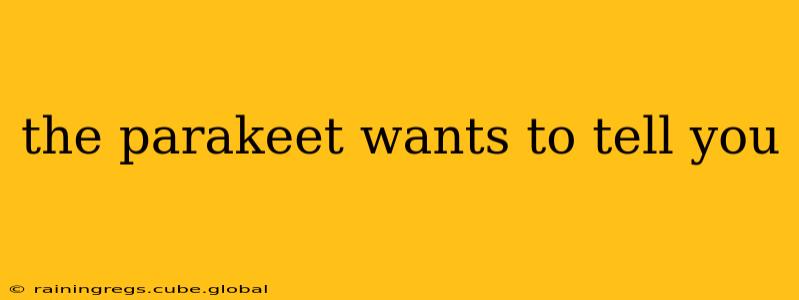The Parakeet Wants to Tell You: Decoding Avian Communication
Parakeets, those vibrant, chattering companions, are far more communicative than their squawks and whistles might initially suggest. While they don't speak human languages, their vocalizations, body language, and even feather ruffling convey a surprisingly rich tapestry of information. Understanding what your parakeet wants to tell you is key to building a strong bond and ensuring their well-being. This article delves into the fascinating world of parakeet communication, helping you decipher those chirps, squeaks, and head bobs.
What are the common sounds parakeets make and what do they mean?
Parakeet vocalizations are incredibly diverse, varying in pitch, tone, and rhythm. A high-pitched, repeated chirp might indicate excitement or a playful mood. Conversely, a low, guttural sound could signify fear or discomfort. Soft chirps often accompany affectionate interactions, while loud, insistent calls may signal a need for attention or food. The context is crucial; observing your parakeet's body language alongside their sounds will provide a more accurate interpretation. For instance, a soft chirp coupled with head-bobbing is likely a friendly greeting, whereas the same chirp accompanied by puffed-up feathers could indicate nervousness.
How do parakeets use body language to communicate?
Body language forms a significant part of parakeet communication. Observe their posture, head movements, and feather position. A relaxed parakeet will typically sit upright with relaxed feathers. Conversely, a frightened parakeet might crouch down, flatten its feathers, and keep its head low. Rapid tail movements often signal excitement or agitation, while slow, deliberate tail wags could indicate contentment. Wing flapping can be a sign of both happiness and distress depending on the context. For example, frantic wing flapping combined with loud squawks indicates fear or stress, whereas gentle wing fluttering during a cuddle session is a clear sign of affection.
What does it mean when a parakeet bites?
Biting in parakeets can stem from several causes, not all of them malicious. Fear, frustration, and hormonal changes can all trigger a bite. A playful nip from a young parakeet is different from an aggressive bite from a stressed or frightened bird. Understanding the context is critical; if your parakeet bites during playtime, it might be a sign of overstimulation. However, a bite delivered during an attempt to handle it could mean it feels threatened or uncomfortable. Establishing trust and respecting their personal space is vital in preventing biting behavior.
How can I tell if my parakeet is happy?
A happy parakeet is a vibrant parakeet! Look for signs like bright, alert eyes, smooth, sleek feathers, active playful behavior, and clear, cheerful chirps. A content bird will readily interact with its owner, engaging in grooming, playful nips, or even mimicking sounds. Their overall demeanor will be relaxed and confident. Conversely, a lethargic, withdrawn parakeet with ruffled feathers and dull eyes might be unwell or stressed.
What are some common signs of a sick or unhappy parakeet?
Recognizing signs of illness or unhappiness is crucial for your parakeet's well-being. These include lethargy, loss of appetite, ruffled feathers, changes in droppings, unusual breathing, and excessive sleeping. If you notice any of these, consult an avian veterinarian immediately. Changes in their behavior, such as increased aggression, excessive vocalizations, or self-mutilation, also warrant immediate veterinary attention. Early intervention can make a significant difference in their recovery.
By carefully observing your parakeet’s unique blend of sounds and body language, you’ll gain a deeper understanding of their world. Remember, consistent interaction, careful observation, and a responsive approach will strengthen your bond and help you become fluent in the language of your feathered friend. This will not only enrich your relationship but also ensure your parakeet lives a happy, healthy, and fulfilling life.
